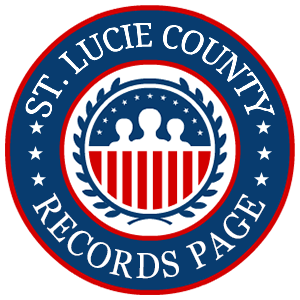Run a free St. Lucie County warrant search seamlessly using the guidance and databases provided in this resource.
No matter the reason for being issued, any warrant is an important court order that must be resolved. Informed parties can help themselves, friends, or family members resolve a warrant or help the police locate a wanted individual.
This step-by-step resource covers the necessary steps needed to effectively obtain records of active warrants in St. Lucie County and the rest of Florida.
A Review of Executing a St. Lucie County Warrant Search for Free
Searchers may need to find out information about warrants issued in St. Lucie County. Fortunately, the state legislature deemed many documents as public records under the Sunshine Law, recorded as Florida Chapter 119: Public Records.1
Warrant is an umbrella term that describes any form of court order that allows law enforcement to seize or search people or property. In Florida, all types of warrants are usually publicly available and completely free to search and discover.
Researchers should be advised that in cases where the records interfere with the administration of law enforcement, the records may be sealed or otherwise unavailable.
Before searching for warrants, the record seeker should have some basic information for the search tools. Generally, you may need to know the person’s first and last name, home city, or where the warrant was issued. With this information, you can find the records you need from the appropriate custodian of these records.
There are several custodians of warrants throughout the state, including the Clerk of the Circuit Court and Comptroller, St. Lucie Sheriff’s Office and the Florida Department of Law Enforcement (FDLE).2
Verify if Someone Else or Yourself in St. Lucie County Has an Active Warrant
In the county, the primary custodian of warrants is the St. Lucie County Sheriff.3 The sheriff office has a specified Warrants Unit to contact for these matters.
Inquiring parties should call 772-462-3330 and ask for the warrants unit. Written documents can be faxed to the Sheriff using 772-462-3329.
Others may want to ask for assistance in-person. The St. Lucie County Sheriff’s Office is open Monday-Friday 8am -5pm.
St. Lucie County Sheriff’s Office
4700 West Midway Rd.
Fort Pierce, FL 34981
The sheriff office provides directions to the office for motorists to use. Be aware that wanted individuals who visit the sheriff’s office will likely be apprehended and taken into custody. It is usually advisable to obtain legal representation for advice before doing so.
For paper correspondence, the sheriff office also accepts mail, but at a different address from the physical location. Envelopes should be addressed to:
St. Lucie County Sheriff
218 S, 2nd Street, Rm B214
Fort Pierce, FL 34950
Warrant information can also be acquired from the St. Lucie County Clerk of the Circuit Court. The court offers a Case Search Tool that can be utilized to search for warrants.4 Cases can be searched through “Name”, “Case Number”, or via “Citation Number”.
Information such as the date the case was opened/closed, the court, and the case type may help filter the best results.
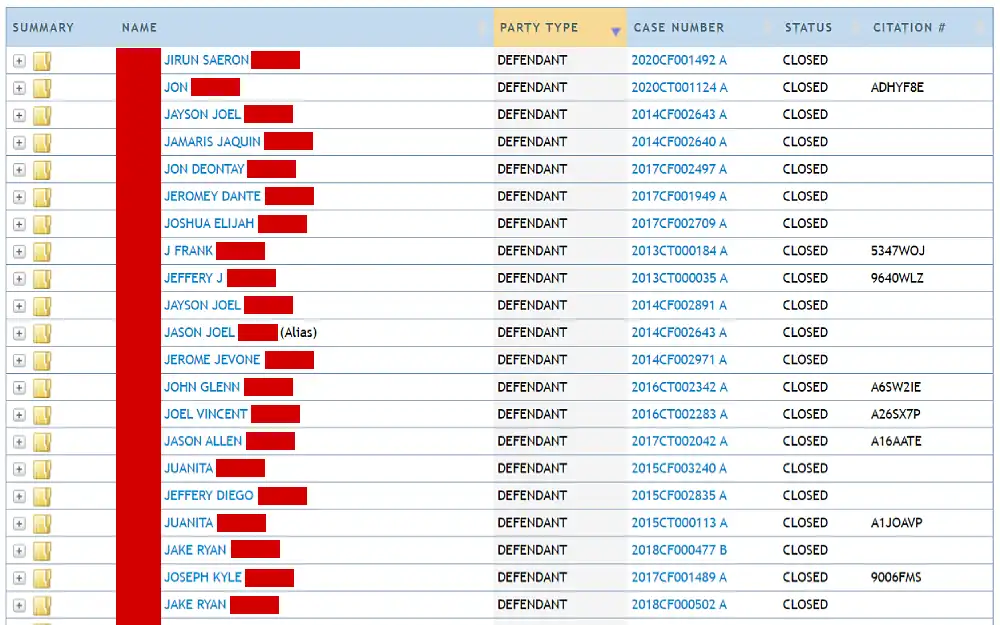
Alternatively, for those individuals who prefer to visit the court instead, they can reach out to the St. Lucie County Clerk of the Circuit Court at
St. Lucie County Clerk of the Circuit Court
201 South Indian River Drive
Fort Pierce, FL 34950
Phone: 772-462-6900
Office Hours: 8am to 5pm | Monday – Friday
Some record seekers may feel more comfortable contacting the local police for their city. The local police also have access to the warrant records even though they are not the custodian of record. In St. Lucie County, this means that the Fort Pierce Police Department and the Port St. Lucie Police Department are also potential contacts to search for or ask questions about warrants.
The local stations can be contacted at:
City of Fort Pierce Police Department
100 N U.S., Highway 1
Fort Pierce, FL 34950
Phone: (772)-467-6800
Port St. Lucie Police Department
121 SW, Port St Lucie Blvd, Bldg. C.
Port St. Lucie, FL 34984
Phone: (772)-871-5000
The county clerk, local police and the sheriff’s office are able to answer questions about warrants via the phone and in-person methods above.
However, since they do not provide any searchable database, some researchers may prefer to use the statewide search tools called FDLE Wanted Persons Search Tool even for this local information.
How To Check for Warrants Throughout Florida
Sometimes you will find that the information you seek is not available at the county level because the warrant originates from elsewhere in Florida. The Florida Department of Law Enforcement (FDLE) is an additional custodian of record for all warrants in the state.6 They provide a free statewide warrant search.
To conduct a statewide warrant search in Florida, navigate to the FDLE Wanted Persons Search Tool.7 You can find the warrant record by entering data about the wanted person.
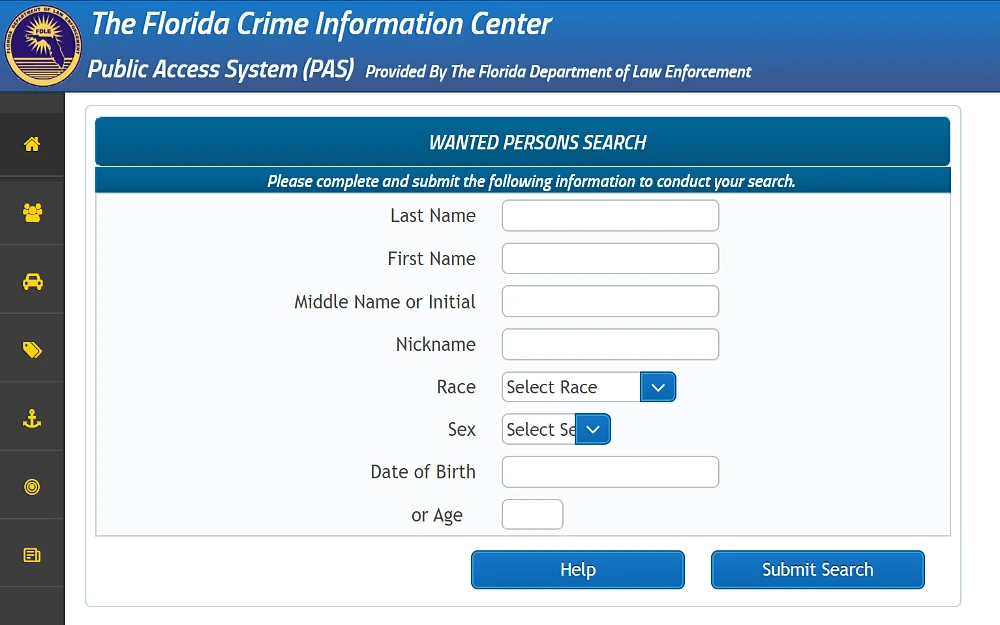
Enter offender’s information such as offender full name, date of birth, sex, race and county or region where the warrant was issued to search. By providing as much accurate subject’s information as possible, searchers may be able to narrow down the search results.
Search results typically display a list of individuals with warrants.
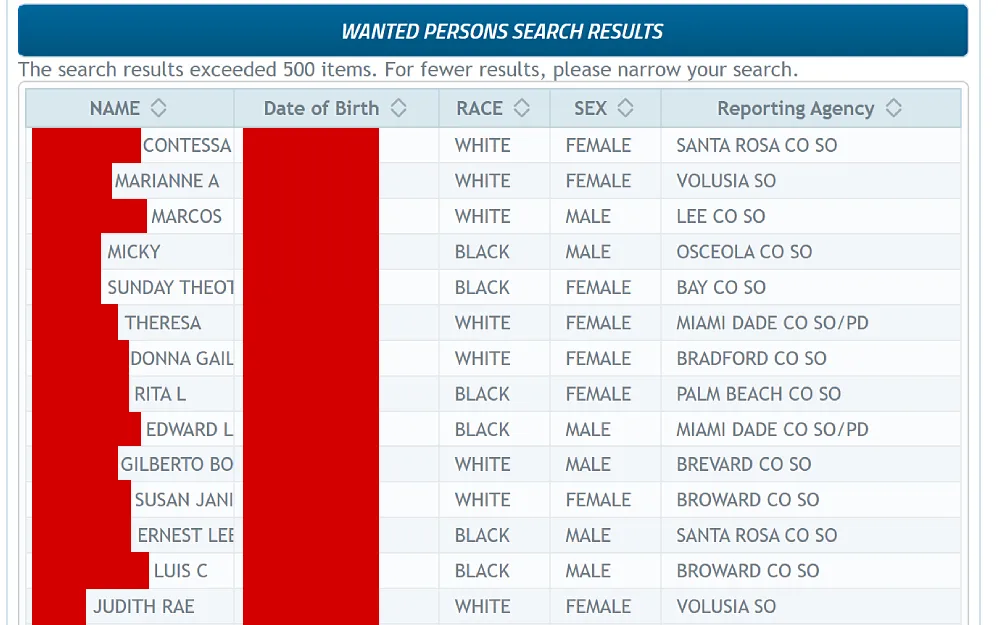
Click on the specific offender name to view details. Information such as the warrant number and the date it was issued is available.
For questions searchers may send an email at [email protected] or call 850-410-7000.
Since Florida makes this statewide database available, many counties simply refer online researchers to this site to find active warrants. However, to find out more information about the warrant or how to resolve the warrant, interested parties have to contact the court or agency that issued it as follow up after gaining the basic warrant information from the search.
Types of Warrants, What They Mean & Their Significance
While this isn’t a comprehensive list, it includes the most common ones. Explain what the various types of warrants below mean and the reason for each in your assigned county (often defined at the state level though) – i.e. some might be for misdemeanors, felonies, failure to appear, etc.
Arrest Warrants: Orders issued by a judge that allow law enforcement to place a person under arrest because they are accused of a crime.
Bench Warrants: These orders are issued by a judge because of something that occurred related to a court proceeding.8 Typically, they are ordered for missing a court appearance. Law enforcement can detain the person and bring them to appear before the judge.
Probation & Parole Violation Warrants: These orders allow the police to detain someone violating these supervised release conditions. Common violations include a positive drug test, missing a meeting with an officer, or committing a new crime. Since the offender has already been convicted of a crime to be on probation or parole in the first place, people with these warrants have fewer procedural rights than others.
Child Support Warrants: Courts often order child support payments to be made by a non-custodial parent. When these payments are in arrears, the court can issue a warrant to detain the person and have them appear before the judge.
Traffic Warrants: Municipal or traffic courts issue these warrants based on non-compliance. For example, judges often issue these for failure to pay parking tickets or failure to appear at a hearing for a DUI.
Capias & Capias Pro Fine Warrants: Capias are special warrants issued when a defendant in a criminal trial fails to appear at a hearing. Often, these are no bond warrants, meaning the person will be held in jail until the trial is complete.
Fugitive Warrants: Any type of warrant issued to apprehend someone who has fled the jurisdiction to avoid arrest or appearance in court. They can also contain extradition instructions, telling police in other counties or states whether or not Florida authorities are willing to pay to have the person sent back to the original court to face the charges.
Search Warrants: Unlike other warrants, a search order applies to property and not a person.9 They allow law enforcement to search someone’s home, vehicle, or other property for evidence of a crime.
Get a Warrant Dropped or Resolved in St Lucie County Florida
Warrants are important court orders that authorize law enforcement to search property or seize and detain people. Therefore, any active warrant is a serious situation. After finding the record of an active warrant, it is just as important to do something about it to resolve the situation.
Some searchers are looking to see if they have a warrant against themselves or a close friend or family member who they are trying to help. In these cases, it is important for the wanted person to first gather any publicly available information.
Most importantly, it is key to know the reason for the warrant and the agency or court it was issued. If the information is about someone else, you can pass along the information you found and recommend they take on legal representation.
If you are the subject of a warrant, begin by obtaining a lawyer to represent you. Your lawyer can advocate for your rights, contact authorities, and give you advice on how to resolve the situation. In some cases, a warrant can be resolved easily by agreeing to a court date or paying past due fines or fees.
In some cases, a wanted person will have to turn themselves in for arrest. In addition to the lawyer, a bail bonds company can assist in this matter. Bail bonds people can help you pay bail and get back out of custody as fast as possible.
Sometimes you may be searching for warrant information about someone you are afraid or suspicious of. First, make sure you prioritize your own safety.
Always call 911 if it is an emergency or you are in danger. Never attempt to apprehend or confront the wanted person yourself.
You can contact authorities in several ways to report the whereabouts of the wanted person. In addition to the main phone numbers provided for the sheriff and local police, you can also leave an online tip using the St. Lucie County Sheriff’s Report a Tip link.10
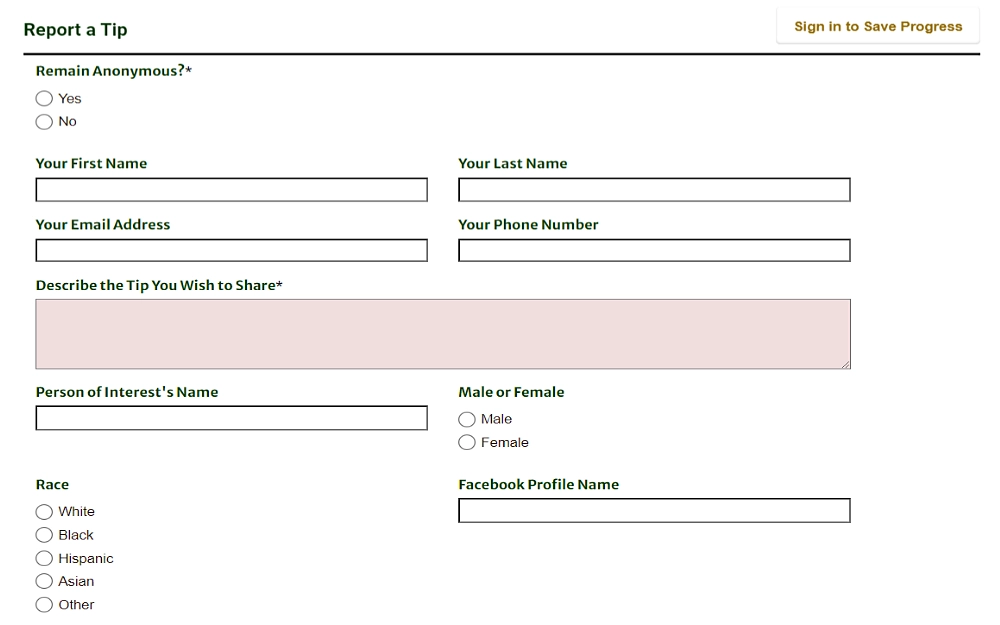
If you prefer to leave anonymous tips with someone other than law enforcement directly, contact the Treasure Coast Crime Stoppers. Crime stoppers is a nationwide network of private organizations that work closely with law enforcement to relay anonymous tips.
The local hotline for these tips is +1.800.273.TIPS (8477). Some users prefer to use the Smartphone APP: P3tips.com.
You may also reach out to the St. Lucie County Sheriff’s Office directly at:11
St. Lucie County Sheriff’s Office
4700 West Midway Rd.
Fort Pierce, Florida 34981
Phone: 772.462.7300
No matter the situation, there is always some action that wanted individuals, interested parties, or concerned citizens can take in response to a warrant. To begin the process, start with a free St. Lucie County warrant search; the information obtained can help resolve a warrant for you or a family member or help police arrest a wanted person.
References
1The Florida Legislature. (2012). Statutes & Constitution: Chapter 119 Public Records. Retrieved April 10, 2024, from <http://www.leg.state.fl.us/Statutes/index.cfm?App_mode=Display_Statute&URL=0100-0199/0119/0119ContentsIndex.html&StatuteYear=2012&Title=-%3E2012-%3EChapter%20119>
2Florida Department of Law Enforcement. (n.d.). About FDLE. Retrieved April 10, 2024, from <https://www.fdle.state.fl.us/About-Us>
3St. Lucie County Sheriff’s Office. (n.d.). About Us. Retrieved April 10, 2024, from <https://www.stluciesheriff.com/27/About-Us>
4St. Lucie County Clerk of the Circuit Court & Comptroller. (n.d.). Court Case Search. Retrieved April 10, 2024, from <https://stlucieclerk.gov/public-search-gen/search-court-cases>
5St. Lucie County Clerk of the Circuit Court & Comptroller. (2024). Case Search. Retrieved April 10, 2024, from <https://courtcasesearch.stlucieclerk.gov/BenchmarkWebExternal/Home.aspx/Search>
6Florida Department of Law Enforcement. (n.d.). Contacts. Retrieved April 10, 2024, from <https://www.fdle.state.fl.us/Contacts>
7Florida Department of Law Enforcement. (2024). Wanted Persons Search. Retrieved April 10, 2024, from <http://pas.fdle.state.fl.us/pas/restricted/PAS/person/WantedPersons.jsf>
8St. Lucie County Clerk of the Circuit Court & Comptroller. (n.d.). Glossary – Bench warrant. Retrieved April 10, 2024, from <https://stlucieclerk.gov/forms-resources/glossary/benchwarrant>
9St. Lucie County Clerk of the Circuit Court & Comptroller. (n.d.). Glossary – Search warrant. Retrieved April 10, 2024, from <https://stlucieclerk.gov/forms-resources/glossary/searchwarrant>
10St. Lucie County Sheriff’s Office. (n.d.). Form Center – Report a Tip. Retrieved April 10, 2024, from <https://www.stluciesheriff.com/FormCenter/Contact-Us-10/Report-a-Tip-53>
11St. Lucie County Sheriff’s Office. (n.d.). Staff Directory. Retrieved April 10, 2024, from <https://www.stluciesheriff.com/Directory.aspx?DID=5>
